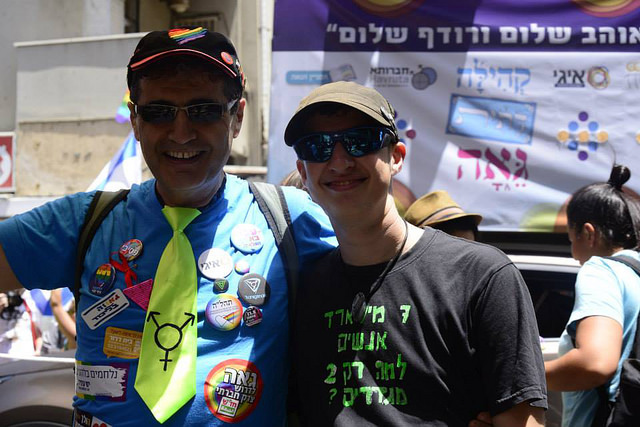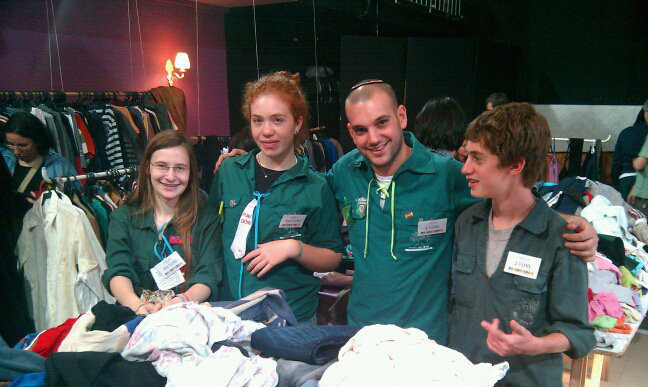Tel Aviv is known as the world’s most gay-friendly city for tourists, but few people realize the extent of social and societal action in which Israel’s LGBT (lesbian, gay, bisexual and transsexual) community is involved.
One organization of particular note is Adam L’Adam Hizdamnut Latet (Human to Human – An Opportunity to Give). For the last 10 years, it has operated anonymously, providing different kinds of assistance to anyone who asks for it, regardless of sexual orientation, religious observance, ethnic background or age.
“Normally, the LGBT community is perceived as demanding something, such as equal rights, or complaining about something, such as discrimination,” key LGBT leader Avi Soffer tells ISRAEL21c. “The idea of Adam L’Adam is that it is all about giving, both within the community and outside of it.”
It is, claims Soffer proudly, “an LGBT endeavor that is unique to the state of Israel.”
Adam L’Adam Hizdamnut Latet is run exclusively by volunteers — 10 full-time staffers, another 100 or so who donate their time when called upon to do so, and hundreds of others who work per project. Donations are spent fully on the charitable work itself, rather than on overhead and salaries.
The organization tries to fulfill all requests, whether delivering daily meals to the elderly, performing home repairs for someone whose apartment was damaged in a fire, or purchasing school supplies for underprivileged kids or the children of foreign workers.
“We rarely give money to people, but rather its equivalent in goods and services or in facilitating trade-offs,” says Soffer. “One person needs something and another has it. We assist in matching them up.”
Free bazaar
One of Adam L’Adam’s regular undertakings is a secondhand bazaar, held four to five times a year at Gan Meir in Tel Aviv. The public is invited not only to donate clothes and other items, but to come and take them, as well.
“It’s a big happening,” says Soffer. “And we encourage everybody to participate – even millionaires. It prevents differentiating between rich and poor, and removes any stigma attached.”
This attitude distinguishes Adam L’Adam from other charitable organizations.
“I’ve been warned that people are liable to take advantage of our bazaars to make money by reselling the items they received for free,” Soffer explains. “And my answer to them is that nothing makes us happier.”
He tells the story of an impoverished woman from the Congo who did just that, at Soffer’s recommendation.
“We suggested she open a used-clothing store in her apartment, using the merchandise we provided her at no cost,” he says. The woman took the advice, and then disappeared for about a year.

“One day she turned up with a suitcase, in which were 12 pairs of brand-new jeans with the labels still on them,” Soffer recounts. “She told me that it was time for her to give something back.”
It emerged that the shop she had opened was now the source of income for her and her entire family, even those in Africa.
This is one of many instances of business empowerment that Adam L’Adam considers a heart-warming achievement.
Recently, Soffer and his life partner, Elisha Alexander, established within Adam L’Adam a sub-organization called “Ma’avarim” (“transitions” or “crossings,” a play on the word “transgender” and its process).
It’s headed by Alexander and aims to help transgendered people like himself to “come out” and take their rightful place in society.
According to Soffer, while gays and lesbians have become more accepted and mainstream within their own families and in society as a whole, transgendered people have a long way to go.
Ma’avarim lobbies the Israeli Health Ministry to change its policy regarding the process that transgenders must undergo in order to have sex-change operations.
Though such surgery is free in Israel, would-be patients must present their case to a committee of experts who can approve or refuse their request.
According to Soffer, however, the greater issue is transgendered people’s difficulties making it to adulthood with proper educational and life skills.
This is due to the ostracism most of them face as a result of their gender identity. Indeed, many transgendered people in Israel – particularly from religious Jewish or Muslim households — end up running away or being kicked out of their homes in their early teens.
Beit Dror (Freedom House), a shelter for LGBT youth up to age 18, provides a roof over their heads as well as professional counseling. Ma’avarim is working with the Tel Aviv municipality on a project called “Dirat Hemshech” (follow-up housing) for those ready to leave the shelter.
“Israel leads in innovations relating to the LGBT community,” concludes Soffer. “This is because organizations like Adam L’Adam Hizdamnut Latet have no agenda other than outreach and compassion.”













